Stuck in Life? Go Where It’s Hard, Cold, and Unforgiving
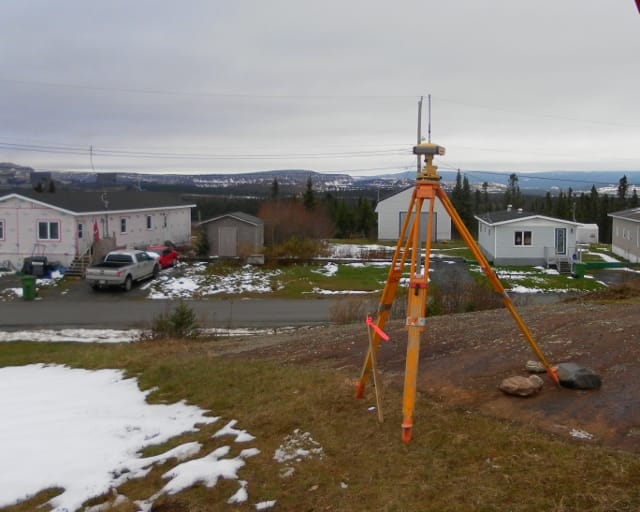
Starting out in life is brutal.
No skills. No clarity. No money.
You don’t even know what you want to do for a living.
Jobs are in high demand and short supply. It quickly turns into a race to the bottom.
I struggled and toiled for many years after graduating university.
I fell behind and was almost completely underwater, before I started following this one principle:
Go where nobody wants to go, and do what no one else wants to do.
I was working in a downtown Toronto office. It was an easy job. I got along great with my coworkers. I had a comfortable apartment in a good part of town.
But I made bad financial decisions, and ended up owing tens of thousands of dollars.
I couldn’t keep up with my monthly payments.
Before landing this corporate office job, I had been working as a land surveyor for almost a decade. It has its perks, but compared to my office job, it’s pretty difficult.
A friend and former coworker moved to northern Labrador from Ontario years before, and was working as a surveyor in the mining industry.
He loved his job, made great money, and told me that if I ever wanted to go back to surveying, they were always looking for staff.
However, there were some major drawbacks to this job:
Bad weather. Long hours. Dangerous conditions.
My schedule was going to be 4 weeks on - 10 days off.
But the pay was almost twice what I was making in my current job with a bunch of overtime.
I told him I wanted to come up north. He put me in touch with his boss. We had a phone interview, and in a few weeks, I was on an airplane going to Wabush, NL.
The next year of my life would make a man out of me.
I knew this was going to be a big shift just getting on the plane for the first leg of my journey. I was going from Toronto to Montreal.
I’m seated next to these tech workers and businessmen in suits going back and forth for meetings, and here I am in this big-ass coat and heavy duty sub-zero work boots because they don’t fit in my bag.
It’s a whole day of flying to get to Wabush, and when you get off the plane, the first thing you feel is air so cold, it cuts right through you.
My friend picked me up from the airport and we drove 10 minutes to Labrador City, where we were staying in a work camp.
The camp was alright. The rooms were small. The bathrooms were shared. The walls were thin. The guy in the room next to mine snored so loud, I started using earplugs to sleep.
But, they served good food. The staff was pleasant. And I got along well with the other guys in different trades from out of town.
After that, I had several days of mine orientation and safety training, plus a drug test. If there’s one thing you need to know about working in the mines, it’s safety.
There are all kinds of procedures, checklists, inspections, meetings, and communications. I needed to wear more Personal Protective Equipment (PPE) here than on any construction site I worked.
We had wheel chocks that we needed to use every time we parked, and in parking lots, we had to reverse back into our spots, because it reduces the risk of accidents.
We would joke that our job was 90% safety and 10% productivity.
While the safety rules were annoying at times, I was happy for them. There were all kinds of hazards and anything could go wrong on a moment’s notice.
Our supervisor in the engineering department had a saying: “It only takes a second to die.”
We did open pit mining for iron ore. This wasn’t an underground mine where we had to constantly worry about cave-ins, low air quality, or confined spaces. But, with open pit mines, we had to worry about heights, falling rocks, and a host of other hazards.
All kinds of heavy machinery was operating - haul trucks, bulldozers, excavators, graders, dump trucks. Every type of trade was working somewhere, bringing in power tools, chemicals, and electrical hazards.
Then you had to worry about natural hazards. This was an area cold enough that if you breathed too rapidly, ice crystals could form in your lungs, causing scar tissue.
Then there’s the wildlife. I heard of encounters with wolves in the area. I saw brown bears a couple times. One girl I met, who worked in wildlife conservation, had to shoot a fox who had rabies. In the summer months, I pretty much lived inside my mosquito jacket.
There was a particular insect in the area the locals called a timber fly - because they were attracted to freshly cut trees for laying their eggs. They’re pretty docile, but have a large stinger. If you get stung, you need to get to a hospital as soon as possible.
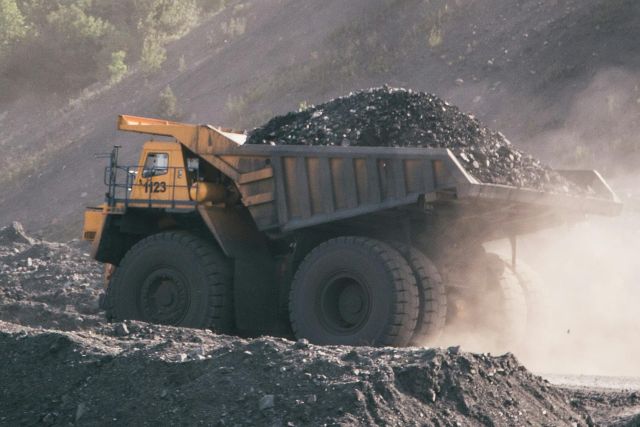
Part of my training was getting to ride in a haul truck. These giant beasts can weigh over 600,000 lbs. and have the capacity to carry up to 400 tons of ore.
The important reason for this ride is to see the view from the driver’s perspective. Driving one of these is like driving a house. You can’t see what’s right in front of you. That’s why they had the right-of-way in the mine.
He could drive over a truck, killing everyone inside, and not even realize that he hit anything - and he almost did.
My driver told me a story from a few weeks previous where he was going down the road when he noticed something moving in the shadow of his vehicle. He hit the brakes and a pickup truck rode out from right in front of him.
It nearly gave him a heart attack.
He reported it to his supervisor. A near-miss report was filed, and the driver of the pickup truck was reprimanded.
I learned that when you mess up on safety in the mines, people talk, and your actions will catch up to you.
Everybody just wants to get paid and go home safe, so don’t be the one who messes it up.
The type of work I did varied. When I first arrived, we were doing layout and recording of drill site locations.
Crews would set up a heavy drill that would bore down into the earth several meters and pull up core samples. The samples would then be analyzed to see if the area was suitable for mining.
Twice a week, the mine closed for blasting. My buddy who got me the job took me out with him one afternoon.
He was laying out evenly spaced stakes in this rock shelf spanning a large area. Everywhere he placed a stake, a drill machine with a bit around a foot in diameter would come in and bore down over 10 meters.
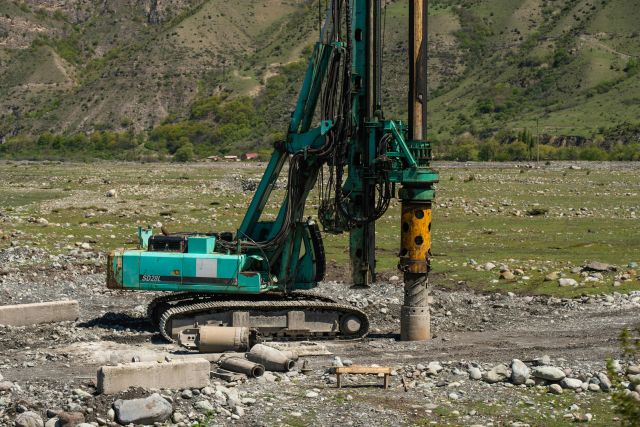
We came back a few days later and all of these holes were filled with this kind of foam. There was wiring all over the ground running into each of the holes.
“Hey man, so this whole place is rigged with explosives?”
“Yeah, we’re getting getting ready to blow this place up!”
“I could have sworn that I just saw a guy light up a cigarette?”
“Don’t worry. You could hold a blowtorch to this stuff and it wouldn’t explode. You need a special type of detonator to ignite it, and they won’t set that up until the morning of the blast.”
“Alright.” *prays silently*
I got the chance to survey the area where the explosives are stored. They stopped you on your way in and confiscated your cigarettes and lighters before you could enter.
I wasn’t a smoker at the time, but my assistant, Rick, had to give up his goods. Too many people absent mindedly light up a smoke without thinking, and they don’t want any accidents.
Every hour or two we were heading back out so he could get his nicotine fix.
Rick was an awesome guy to work with, and he quit smoking later that year. He was from mainland Newfoundland and had 20 years experience working as a chainsaw operator for logging companies.
We didn’t just work for the mines, we also did a lot of jobs for people who had cabins.
You could build a cabin on crown land, and after a certain period you could apply to buy that land from the government.
We would come in, survey the property, and set the property lines.
These jobs often involved cutting down the trees along the boundary.
I can use a chainsaw, but compared to Rick, I’m an amateur. This guy is like a surgeon with that chainsaw.
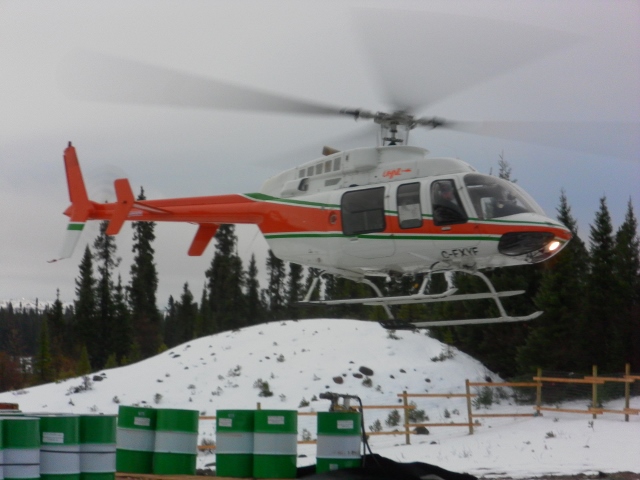
By far, the coolest job we ever did was setting out and recording drill sites in a remote area outside of town.
There were no roads going to this place, so the mining company hired a helicopter to air drop workers and equipment to the job site.
The other guys sat back like it was nothing. Me? I was giddy like a small child. We were getting airlifted into the middle of the forest. How could I not be excited?
We were lucky to have several shifts working on that job. However, one of them was one of the worst days ever, and all because of one reason - I forgot to bring water.
Dehydration was getting to me by midday, but I had no choice other than to keep going.
By the time I got back to the truck, I was exhausted. I downed three bottles of water inside of 15 minutes and went home feeling miserable.
Every time we went out after that, my backpack was loaded up with water.
A few weeks later, Rick and I were on our way to another job. We were listening to the news on the radio when it mentioned there had been a helicopter crash in Wabush.
Was this the helicopter we were riding on?
Who knows? We had work to do, so we went about our day.
When we returned to town, we saw a flatbed truck sitting in a parking lot. Loaded up on the back was a busted up orange and white helicopter.
It sure looked like the one we rode on.
About a month later, we were called back to the helicopter job. I met with the site supervisor and asked him about the crash.
He confirmed that the helicopter that went down was the one we were riding on.
Most helicopter crashes occur due to pilot error, but in this case the engine had seized.
The pilot was the only one on board, and he had a tow rope attached for moving equipment. The engine stopped dead and the aircraft fell out of the sky like a rock.
The pilot survived and was healing. He broke a couple bones in his hand and compressed some disks in his spine, but he was eager to get back to work.
Thank God he was okay.
It was a chilling reminder of how things can go wrong, even when you follow all the rules.
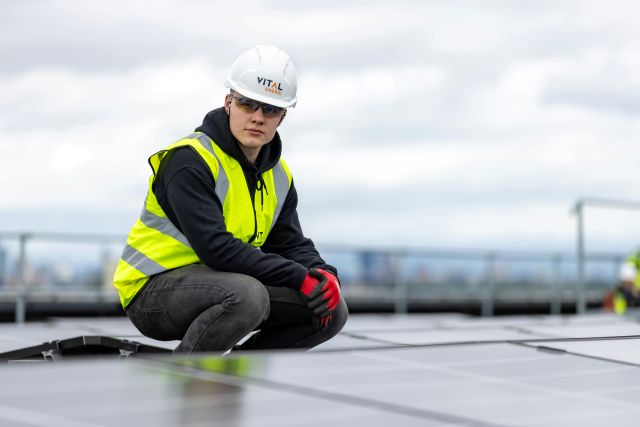
It wasn’t all craziness and danger out there. Most of the work I did was pretty mundane.
I picked up some of the Newfoundlander / Labradorian slang. It’s hard to decipher, and the natives get off knowing that you don’t understand them.
To this day, I don’t know if “Where are you to?” means Where are you going? Where are you from? or Where are you now?
I would just answer all of it. “I’m in the Luce South Pit at the moment, heading back to the Engineering building shortly, but I’m over here from Toronto.”
It was also the most blue collar environment I had ever been in.
I’ve spent a lot of time working construction sites, but they have nothing on the mining industry.
These men here are hardened, tough, and able to work under stress in the most extreme environments.
They’re also caring, friendly, and willing to go out of their way to help others.
One guy I met was working as a safety inspector. He took a one year college course in health and safety, and then waltzed right into a six figure job. How was this possible? Nobody wants to be a safety inspector. Those guys are dorks.
My paychecks were pretty much double what I was earning in Ontario, and there was nothing to spend it on, because there wasn’t much to do outside of work.
I read Convict Conditioning and followed their bodyweight workout plan, which only took about 30 minutes a day. I set aside time to read after work and ended up reading an average of four books each month.
Eventually, between the money I was earning and some other moves I made, I got myself out of debt and into the black.
Towards the end of the year, I booked a trip to Nicaragua and got to do something I wanted to try for over a decade - surfing.
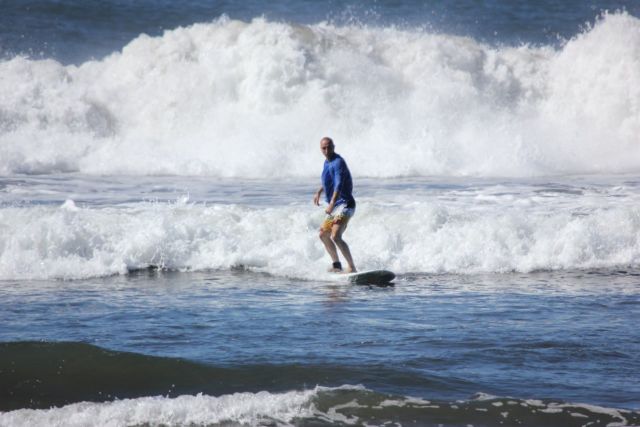
When things slowed down over the holidays, I wasn’t being called back into work, I decided that I had enough and returned back to my cushy office job.
I thought it was easy before, but now this was kids stuff.
I was hardened and conditioned to work in high stress environments, extreme conditions, and face dangerous situations.
I wasn’t fretting about paying off my credit cards, and could actually get ahead.
So why am I telling you this?
When I was up north, people were constantly looking to hire employees and couldn’t find help.
If you’re a young guy, and you’re wondering what you should do with your life.
You want to know how to get ahead?
Maybe you have debts.
Maybe you don’t have any skills.
You’ve got to sacrifice your current life—comfortable but going nowhere—for one that builds the man you want to become.
Go where no one wants to go, and do what no one else wants to do.
The competition is low.
At this stage of your life, you aren’t bogged down with a mortgage, wife, kids, or anything serious.
So if you’re lost right now—broke, stuck, or unsure of what to do—put yourself in a challenging situation.
Don’t let the little comforts in life keep you from becoming something greater.
Go where no one wants to go.
Do what no one else will.
That’s where the growth is.
That’s where the money is.
That’s where freedom is.
That’s where a future worth living is.
Leave a comment and subscribe to this page if you’re ready to stop living on easy mode.
I’ll help you get started.
God Bless.

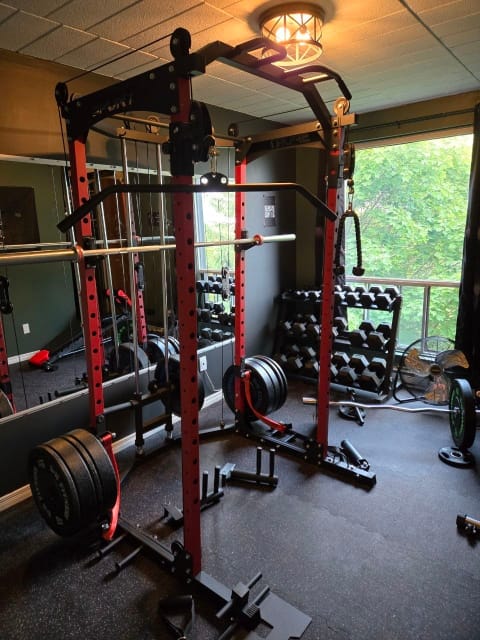



Member discussion